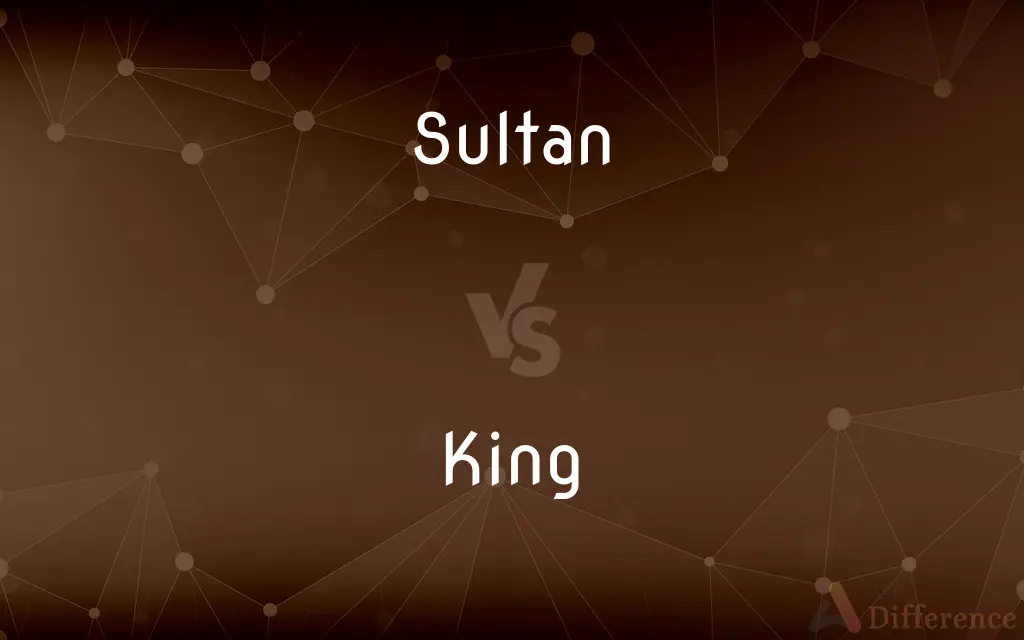Sultan vs. King — What's the Difference?
Edited by Tayyaba Rehman — By Fiza Rafique — Updated on September 27, 2023
A "Sultan" is a Muslim sovereign ruler, especially in former Ottoman territories, while a "King" is a male monarch reigning over an independent state or territory.

Difference Between Sultan and King
Table of Contents
ADVERTISEMENT
Key Differences
The titles Sultan and King both refer to sovereign rulers, but they originate from different cultural and historical contexts. Sultan is primarily used in Muslim-majority regions, especially within the historical territories of the Ottoman Empire. In contrast, the title of King has broader global usage and can be found in multiple cultures and regions.
Sultan traditionally holds religious significance, emphasizing both spiritual and temporal authority in Islamic governance. The King, while occasionally having religious roles in some cultures, is mainly a secular title, indicating sovereignty over a realm. Historically, many Kings were anointed in religious ceremonies, but their primary role remained as the head of state.
The territories ruled by a Sultan might be called sultanates, while those under a King are often referred to as kingdoms. While both sultans and kings might inherit their positions, the process and traditions surrounding succession can vary widely. For instance, a Sultan in the Ottoman context might face different succession customs than a King in a European monarchy.
While both titles signify power and leadership, their symbolic meanings can differ. The title Sultan often carries with it the weight of Islamic tradition and jurisprudence. Meanwhile, the term King can be associated with various cultural narratives, legends, and histories, depending on the region.
Comparison Chart
Origin
Primarily Muslim-majority regions
Global usage in various cultures
ADVERTISEMENT
Religious Significance
Often holds both spiritual and temporal authority
Mainly a secular title, though can have religious roles in some cultures
Territories
Called sultanates
Called kingdoms
Cultural Association
Associated with Islamic tradition and jurisprudence
Associated with various cultural narratives depending on the region
Historical Context
Especially in former Ottoman territories
Found in multiple historical contexts globally
Compare with Definitions
Sultan
A ruler in certain Muslim countries, especially of the former Ottoman Empire.
The last Sultan of the Ottoman Empire was deposed in 1922.
King
King is the title given to a male monarch in a variety of contexts. The female equivalent is queen, which title is also given to the consort of a king.
Sultan
In some contexts, it refers to a ruler who holds more power than the title might suggest.
The Sultan wielded both political and religious authority.
King
A male sovereign.
Sultan
A title used historically in Muslim regions indicating authority.
The Mughal emperors were sometimes referred to as sultans.
King
One that is supreme or preeminent in a particular group, category, or sphere
"In many countries, soccer is the king of sports" (Cameron W. Barr).
Sultan
Sultan (; Arabic: سلطان sulṭān, pronounced [sʊlˈtˤɑːn, solˈtˤɑːn]) is a position with several historical meanings. Originally, it was an Arabic abstract noun meaning "strength", "authority", "rulership", derived from the verbal noun سلطة sulṭah, meaning "authority" or "power".
King
A man chosen as the winner of a contest or the honorary head of an event
A homecoming king.
Sultan
A ruler of a Muslim country, especially of the former Ottoman Empire.
King
Abbr. K A playing card bearing the figure of a king, ranking above a queen.
Sultan
A powerful person
A sultan of vice and corruption.
King
Abbr. K The principal chess piece, which can move one square in any direction and must be protected against checkmate.
Sultan
(historical) The holder of a secular office, formally subordinate to, but de facto the power behind the throne of, the caliph.
King
A piece in checkers that has been moved to the last row on the opponent's side of the board and been crowned, thus becoming free to move both forward and backward.
Sultan
A hereditary ruler in various Muslim states (sultanate), varying from petty principalities (as in Yemen), often vassal of a greater ruler, to independent realms, such as Oman, Brunei, Morocco (until 1956) or an empire such as the Turkish Ottoman Empire.
King
Kings(used with a sing. verb) See Table at Bible.
Sultan
A variant of solitaire, played with two decks of cards.
King
A king-size bed.
Sultan
A breed of chicken originating in Turkey, kept primarily in gardens for ornamental reasons. See: sultan (chicken)
King
Principal or chief, as in size or importance.
Sultan
A ruler, or sovereign, of a Mohammedan state; specifically, the ruler of the Turks; the Padishah, or Grand Seignior; - officially so called.
King
Of or relating to a king-size bed
King sheets.
A king bed skirt.
Sultan
The ruler of a Muslim country (especially of the former Ottoman Empire)
King
To make (a piece in checkers) into a king; crown.
Sultan
A Muslim sovereign ruler.
The Sultan of Oman visited the neighboring countries.
King
A male monarch; a man who heads a monarchy. If it is an absolute monarchy, then he is the supreme ruler of his nation.
Henry VIII was the king of England from 1509 to 1547.
Sultan
The title for certain rulers who claim almost full sovereignty in practical terms.
The Sultan of Brunei has immense wealth and influence.
King
A powerful or majorly influential person.
Howard Stern styled himself as the "king of all media".
King
Something that has a preeminent position.
In times of financial panic, cash is king.
King
A component of certain games.
King
(chess) The principal chess piece, that players seek to threaten with unavoidable capture to result in a victory by checkmate. It is often the tallest piece, with a symbolic crown with a cross at the top.
King
(card games) A playing card with the letter "K" and the image of a king on it, the thirteenth card in a given suit.
King
A checker (a piece of checkers/draughts) that reached the farthest row forward, thus becoming crowned (either by turning it upside-down, or by stacking another checker on it) and gaining more freedom of movement.
King
The central pin or skittle in bowling games.
King
A king skin.
Oi mate, have you got kings?
King
A male dragonfly; a drake.
King
A king-sized bed.
King
The monarch with the most power and authority in a monarchy, regardless of sex.
King
(graph theory) A vertex in a directed graph which can reach every other vertex via a path with a length of at most 2.
King
To crown king, to make (a person) king.
King
To rule over as king.
King
To perform the duties of a king.
King
To assume or pretend preeminence (over); to lord it over.
King
To promote a piece of draughts/checkers that has traversed the board to the opposite side, that piece subsequently being permitted to move backwards as well as forwards.
King
To dress and perform as a drag king.
King
A Chinese musical instrument, consisting of resonant stones or metal plates, arranged according to their tones in a frame of wood, and struck with a hammer.
King
A chief ruler; a sovereign; one invested with supreme authority over a nation, country, or tribe, usually by hereditary succession; a monarch; a prince.
Kings will be tyrants from policy, when subjects are rebels from principle.
There was a State without king or nobles.
But yonder comes the powerful King of Day,Rejoicing in the east
King
One who, or that which, holds a supreme position or rank; a chief among competitors; as, a railroad king; a money king; the king of the lobby; the king of beasts.
King
A playing card having the picture of a king{1}; as, the king of diamonds.
King
The chief piece in the game of chess.
King
A crowned man in the game of draughts.
King
The title of two historical books in the Old Testament.
King
To supply with a king; to make a king of; to raise to royalty.
Those traitorous captains of Israel who kinged themselves by slaying their masters and reigning in their stead.
King
A male sovereign; ruler of a kingdom
King
A competitor who holds a preeminent position
King
A very wealthy or powerful businessman;
An oil baron
King
Preeminence in a particular category or group or field;
The lion is the king of beasts
King
United States woman tennis player (born in 1943)
King
United States guitar player and singer of the blues (born in 1925)
King
United States charismatic civil rights leader and Baptist minister who campaigned against the segregation of Blacks (1929-1968)
King
A checker that has been moved to the opponent's first row where it is promoted to a piece that is free to move either forward or backward
King
One of the four playing cards in a deck bearing the picture of a king
King
(chess) the weakest but the most important piece
King
A male sovereign head of state.
The King decreed new laws for the kingdom.
King
A man awarded a nonhereditary title by a sovereign in recognition of merit.
He was made a King by the reigning monarch.
King
A person or thing regarded as the best or most important of its kind.
Elvis Presley is often called the King of Rock and Roll.
King
The male ruler of an independent state, especially one who inherits the position by birthright.
The young King ascended the throne after his father's demise.
King
A playing card bearing a representation of a king, ranking next below an ace.
She placed the King of hearts on the table.
Common Curiosities
Can a King be of any religion?
Yes, a King can belong to any religion depending on the region's cultural and historical context.
Are sultanates smaller than kingdoms?
Not necessarily. The size of sultanates or kingdoms depends on historical, political, and geographic factors.
Did the Sultan hold more power than the King in medieval times?
The power a Sultan or King held varied widely based on the specific region and historical period.
Which title is older, Sultan or King?
The title "King" has ancient origins in multiple cultures, while "Sultan" is rooted in Islamic history, making "King" an older title in a global context.
Can a woman be a King or Sultan?
While women rulers are typically called "Queens," there are instances in history where women have held the title of "Sultana" in Muslim regions.
Is "Sultan" an Arabic word?
Yes, "Sultan" originates from Arabic, meaning "authority" or "power".
Is a Sultan always a Muslim ruler?
Typically, yes. The title "Sultan" is primarily used in Muslim-majority regions.
Is there a difference in the ceremonial roles of a Sultan and a King?
Yes, ceremonies, rituals, and traditions can differ widely between sultans and kings, reflecting cultural and religious differences.
Share Your Discovery

Previous Comparison
Apex vs. Culmination
Next Comparison
Tax vs. TollAuthor Spotlight
Written by
Fiza RafiqueFiza Rafique is a skilled content writer at AskDifference.com, where she meticulously refines and enhances written pieces. Drawing from her vast editorial expertise, Fiza ensures clarity, accuracy, and precision in every article. Passionate about language, she continually seeks to elevate the quality of content for readers worldwide.
Edited by
Tayyaba RehmanTayyaba Rehman is a distinguished writer, currently serving as a primary contributor to askdifference.com. As a researcher in semantics and etymology, Tayyaba's passion for the complexity of languages and their distinctions has found a perfect home on the platform. Tayyaba delves into the intricacies of language, distinguishing between commonly confused words and phrases, thereby providing clarity for readers worldwide.















































